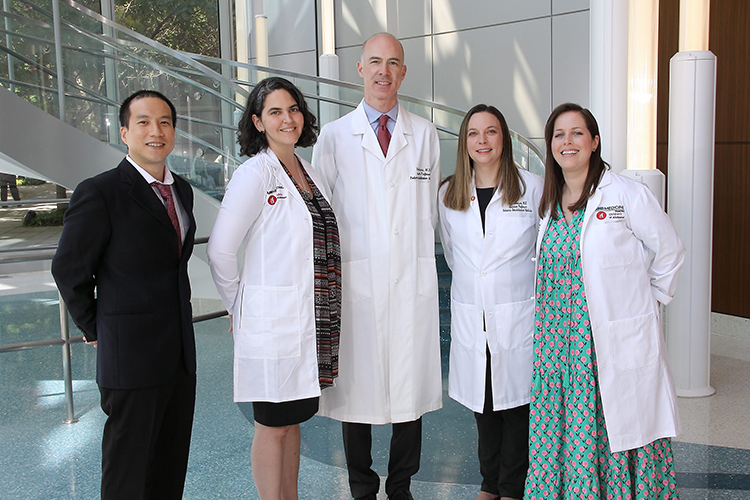
The Division of Pediatric Rehabilitation Medicine at Children's of Alabama Hospital utilizes an interdisciplinary approach to address the prevention, diagnosis, treatment and management of congenital and childhood onset physical impairments including related or secondary medical, physical, functional, psychosocial, cognitive and vocational limitations or conditions, with an understanding of the life course of disability.
Our program collaborates with other agencies and organizations to serve children with disabilities. Child/family involvement in support groups and educational programs is encouraged when appropriate. Together with children and family members, the Division of Pediatric Rehabilitation Medicine serves as an advocate for disabled children with the goal that each child will be able to achieve the highest level of independent functioning possible.
The Division of Pediatric Rehabilitation Medicine is made up of doctors, nurses, therapists and others who specialize in the prevention, diagnosis, treatment and management of injuries and conditions that affect the brain, spinal cord, nerves, bones and muscles of children and adolescents.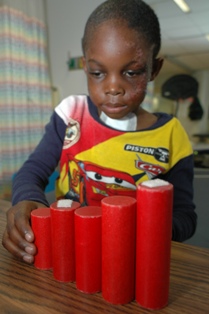 Some of the conditions we commonly treat include traumatic brain injury, spinal cord injury, cerebral palsy, spina bifida, muscular dystrophy and brachial plexus injury.Pediatric Rehabilitation Medicine offers a variety of services, including:
Some of the conditions we commonly treat include traumatic brain injury, spinal cord injury, cerebral palsy, spina bifida, muscular dystrophy and brachial plexus injury.Pediatric Rehabilitation Medicine offers a variety of services, including:
Useful Links
Pediatric Rehabilitation Medicine at Children's of Alabama collaborates with other agencies and organizations to serve patients with disabilities.
-
Click Here
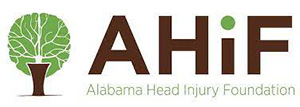
Alabama Head Injury Foundation
The Alabama Head Injury Foundation (AHIF) was founded by professionals and families in 1983 to increase public awareness of Traumatic Brain Injury (TBI) and to stimulate the development of supportive services. Today, AHIF is among the largest state brain injury associations in the nation with model programs and statewide services.
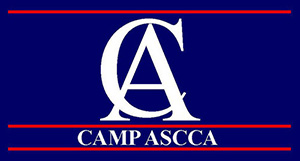
Camp ASCCA
ASCCA stands for Alabama's Special Camp for Childen and Adults. Its mission is to help children and adults with disabilities achieve equality, dignity and maximum independence through a safe and quality program of camping, recreation and education in a year-round barrier-free environment.

Children's Rehabilitation Service
A division of the Alabama Department of Rehabilitation Service, Children's Rehabilitation Service (CRS) is a statewide organization of health-care professionals who are committed to providing quality medical rehabilitation, care coordination and support services for children and adolescents with special health-care needs and their families. Every county in Alabama is served through a network of 15 community-based offices.
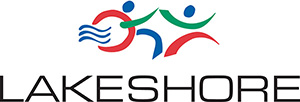
Lakeshore Foundation
Lakeshore Foundation is a not-for-profit organization that promotes independence for persons with physically disabling conditions and opportunities to pursue active, healthy lifestyles. The Foundation offers a wide range of fitness, recreation, athletic and education programs to members - children and adults who experience some 32 different diagnostic conditions including spinal cord injuries, cerebral palsy, multiple sclerosis, stroke, amputation, head injury, birth conditions or trauma from accidents or acts of violence.

Magic Moments
Magic Moments is a federally-recognized 501(c)(3) non-profit organization that is dedicated to making the dreams of Alabama's children come true by giving them a magic moment that will last a lifetime.

Muscular Dystrophy Association
The Muscular Dystrophy Association (MDA) combats neuromuscular diseases through programs of worldwide research, comprehensive medical and community services and far-reaching professional and public health education.

National Brain Injury Association, Inc.
The Brain Injury Association of America (BIAA) is the leading national organization serving and representing individuals, families and professionals who are touched by a life-altering, often devastating, traumatic brain injury (TBI). The BIAA provides information, education and support to assist the 5.3 million Americans currently living with traumatic brain injury and their families.

Spina Bifida Association of America
The Spina Bifida Association of America (SBAA) serves adults and children who live with the challenges of Spina Bifida. The mission of SBAA is to promote the prevention of spina bifida and to enhance the lives of all affected. Its tools are education, advocacy, research and service.
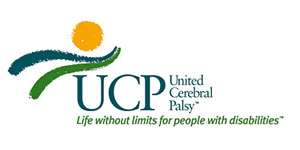
United Cerebral Palsy
United Cerebral Palsy (UCP) is the leading source of information on cerebral palsy. UCP's mission is to advance the independence, productivity and full citizenship of people with disabilities through an affiliate network.
Rehabilitation Team
-
Meet the Team
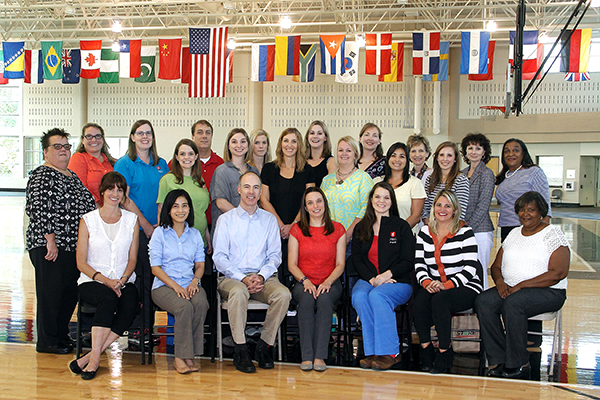
Inpatient and Outpatient Rehabilitation services at Children's of Alabama are provided by professionals who recognize the uniqueness of each child and support the accomplishments of mutually established goals. The child's abilities, rather than disabilities, are emphasized. Further, the Rehabilitation Team believes the involvement of child and family in goal setting is essential for success.
The Rehabilitation Team includes the following professionals:
Physician - The physician specializes in pediatric Physical Medicine and Rehabilitation (PM&R). The physician's primary responsibility is for the medical care of the child.
Nurse Clinician/Practitioner - The nurse clinician/practitioner with the Rehabilitation Medicine team is available to patients and families to answer questions regarding the child's hospitalization and plan of care. He or she also assists with patient and family education and discharge planning. The practitioner often discusses patient progress and advocates for items needed after hospitalization with insurance companies, case managers and school officials.
Occupational Therapist - The Occupational Therapist, through evaluation and treatment, provides patients with an opportunity to reach their maximum level of physical and psychosocial function so that they can live independently. Occupational Therapists teach patients how to perform activities of daily living (such as dressing, bathing, feeding and personal hygiene). Exercise programs are developed to improve muscle strength and endurance of the upper extremities and trunk musculature. The OT may conduct evaluations to help the family make the home physically more accessible and provide adaptive equipment recommendations when indicated to maximize the patient's level of function in the home.
Physical Therapist - Physical Therapy services are aimed at helping patients overcome difficulties with movement caused by injury or disease so that they can more fully participate in life's activities. The Physical Therapist evaluates the patient and develops and carries out a treatment plan to improve and restore mobility, strength, flexibility, endurance, balance and coordination. The PT will teach the patient and family how to move safely and efficiently utilizing adapted equipment and/or devices when needed. The PT may also recommend and assist with acquisition of appropriate assistive mobility devices for home use prior to discharge.
Speech Language Pathologist - The Speech-Language Pathologist will be involved when there is difficulty with communication or cognition. He or she will help improve language skills, including comprehension of what your child hears and read, as well as how to express oneself with words and written language. Assistance and suggestions will be given to help speech clarity if the child's speech is difficult to understand. Cognitive areas may also be addressed in therapy, such as concentration, orientation, memory, problem-solving and organizational skills. The speech-language pathologist also works as part of a team to evaluate swallowing difficulties and ensure that your child can swallow safely and efficiently.
Therapeutic Recreation Therapist – The Therapeutic Recreation Specialist provides patients with opportunities that will help them become more socially involved with others. Through participation in therapeutic recreation programs, patients will develop and use their physical and intellectual abilities as well as learn new skills and/or modify old ones. When appropriate, patients attend community reentry outings which allow them to practice new skills before they return home. Taking time for recreation is an important part of good mental health.
Unit Nurse - The nurses, along with other team members, provide 24-hour care to children. They assess each child's health status every shift and develop an appropriate plan of care. Any abnormal or unexpected findings are reported to the physician. Rehabilitation nurses assist with the education and training of the patient and family members to safely perform all prescribed patient care activities, such as medication administration, self-care tasks, including bowel/bladder programs and maintenance of healthy skin. The nurses, along with members of the rehabilitation team, work together so that the transition from hospital to home can be accomplished smoothly.
Pastoral Care - The chaplain provides support to patients and families and assesses resilience factors. The chaplain encourages patients and families to identify, recognize and use spiritual resources available for living with hope in their present situation.
Pediatric Neuropsychologist - The neuropsychologist evaluates neuropsychological functioning including cognition, behavior, personality and coping skills. He or she provides children, youth and their families with recommendations designed to enhance independent functioning and overall well-being. The neuropsychologist also serves as a consultant to other members of the Rehabilitation Team, families, schools, mental health professionals, physicians and attorneys.
Counselor - A counselor typically sees all patients on the rehabilitation service and their family members. Individual counseling helps each family member identify, understand and resolve personal and relationship difficulties. Family counseling helps a family work together more effectively and supports the growth and development of all its members. Counselors also provide coping techniques to families and patients to help reduce and manage stress and anxiety.
Registered Dietitian - The dietitian plays an integral role in the care of the child. A thorough nutritional assessment is conducted upon admission to determine each child's unique needs. The dietitian monitors each child's nutritional status, ensures nutritional needs are met and assists in choosing a healthy lifetime diet.
Respiratory Therapist - A respiratory therapist is available to assess the breathing status of children. Treatment is provided by the respiratory staff as deemed necessary by the medical staff. Respiratory therapists provide the family and the child with education regarding respiratory needs.
Social Worker - The social worker serves as a patient and family advocate and ensures that the family has input into the patient's treatment program. The social worker keeps the family informed of the patient's process and sets up family conferences and teaching sessions as needed. Assistance in understanding financial resources, community services and follow-up issues will also be provided. The social worker assists the patient and family in their discharge planning by making appropriate community referrals and helping to obtain special equipment.
Teacher - The teacher will discuss the spectrum of services available to your child through your local school system. He or she initiates contact with your child's school to let administration know what services and supports may be needed upon discharge. When appropriate, the teacher will request and assist your child with his or her school assignments while he or she is hospitalized. The teacher also provides assistance in the transition from the hospital setting by arranging homebound school services, participating in IEP/504 meetings and/or assisting with the school re-entry program.
Faculty & Staff
Division Director
Staff
Tunyia Clark
Clinical Admin Office Specialist IV
tunyiaclark@uabmc.edu
205.638.2945
Tameka Young
Clinical Admin Office Specialist IV
tamekayoung@uabmc.edu
205.638.2203
Dannielle Glenn
Administrative Supervisor
cdglenn@uabmc.edu
205.638.7575
Faculty List
Rehabilitation Medicine Faculty
![]()